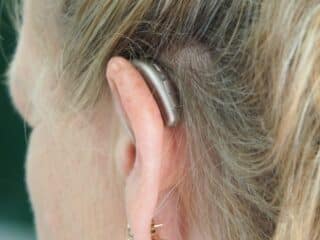
Infants can be born with hearing problems, and a gradual loss of hearing can occur in the elderly as their approach the latter years of their lives too. This problem can be quite debilitating, making it difficult for those affected to be able to communicate, work, and live in the same ways as those around them. One potential solution to the problem is cochlear implants.
What Are Cochlear Implants?
A cochlear implant is a small electronic device that can help to restore hearing in those who are suffering from hearing loss or other issues affecting this sense. An implant can be a useful option for those who have inner-ear damage, as well as for those who aren’t getting sufficient help from regular hearing aids.
While hearing aids are designed to boost the volume of sounds around you, a cochlear implant works differently; it’s designed to guide the sound signals past the damaged areas of the ear through towards the auditory nerve, where those signals can be interpreted and understood by the brain.
These implants make use of a small sound processor which sits behind the ear and captures sound signals. It sends those signals through to the receiver implant, placed beneath the skin behind the ear, which then transmits the signals further through to the nervous system.
The sounds heard by a person with cochlear implants aren’t quite the same as what someone with healthy hearing would hear, and it can take time for those with implants to gradually understand and interpret the sounds they hear, but they can make a real difference in helping them communicate with others and enjoy their lives to the fullest.
The Purposes and Benefits of Cochlear Implants
Cochlear implants are generally recommended for those who have quite severe hearing loss. Those with more mild hearing issues can benefit from simple hearing aids, but when the damage is too great, an implant may be the best option available.
They can greatly help to improve quality of life and may be positioned in just one ear or both ears, depending on the health status of the patient in question. They can be given to people of almost any age, from babies of 6 months to men and women in their 80s, 90s, and beyond, and here are some benefits and uses of these implants:
- Cochlear implants can allow individuals to recognize speech without the need to learn lip-reading or sign language.
- They can also allow people to hear everyday sounds around them, like approaching cars on the road or the singing of birds in the trees.
- They allow users to be able to listen and focus more clearly in noisy locations.
- They also make it easier for people with hearing problems to identify the sources and locations of the sounds around them.
- They can allow people to listen to music, watch TV and movies, and partake in telephone discussions.
Who Is Eligible?
In order to be eligible to receive a cochlear implant, you must fulfill certain conditions, including:
- Severe hearing loss that affects your communication with others.
- A lack of effectiveness from using hearing aids.
- Motivation to participating in hearing rehabilitation classes.
- No other medical conditions or problems that could cause complications with the implants.
- An understanding that the cochlear implants will not completely restore your natural sense of hearing and an acceptance of the limitations and capacities of this technology.
Risks
There are some risks associated with cochlear implants. It’s rare for complications to occur, but the installation of this implants does involve a surgical procedure, so there’s always a chance of certain things going wrong or the body reacting unexpectedly.
Potential risks may include loss of residual hearing, inflammation of membranes around the brain and spinal cord, infection in the operated area, a failure of the device that needs to be repaired, tinnitus, dizziness, and some other problems.
Final Word
Clearly, cochlear implants can make a massive difference and represent one of humanity’s greatest achievements in terms of reversing the damage done to the inner ear and bringing hearing back to those who have lost it.





